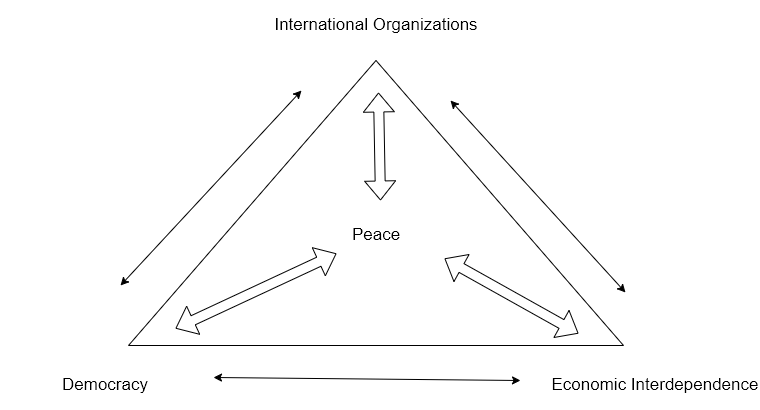Liberalism
Liberalism Summary
- Analytical units: State and non-state actors are important
- View of actors: State can be disaggregated, some components may function transnationally
- Behavioral dynamics: Foreign policy making and transnational processes involve conflict, bargaining, coalition and compromise which means not necessarily resulting in optimal outcomes
- Issues: Multiple agendas, socio-economics, welfare as important issue
Key Assumption
- The belief in the rational qualities of individuals
- Faith in the feasibility of progress in the social life
- The conviction that humans, despite their self-interest, are able to cooperate and construct a more peaceful and harmonious society
Three Set of Liberal Rights
Within the liberal framework, three sets of rights form the foundation. These include:
- Individual rights to the right to private property
- Right necessary to protect and promote the capacity of social economy rights
- Democratic participation or representation
Liberals emphasize the importance of private property rights, believing individuals have a right to own property and engage in market transactions freely. This enables individuals to pursue their economic interests and contributes to an efficient allocation of resources and economic prosperity.
In addition, liberals argue that some rights are necessary to promote social welfare and regulate the economy. These include rights to education, healthcare, social security, and labor regulations. While valuing free markets, liberals contend that governments should provide services and protections to support a thriving economy and society.
Finally, liberals stress democratic participation and representation. Citizens should have the right to elect their leaders and influence government policy. Democratically elected governments, representing the will of the people, can best protect individual liberties. Through voting, civil liberties, and active civic participation, citizens can shape their society.
Realist Constraint
The realist perspective presents an alternative view of the international system. According to realists, the international arena operates in a state of anarchy, with no overarching authority to govern relations between sovereign states. This creates an inherently competitive environment, where states must be continuously aware of potential threats from other nations.
Immanuel Kant’s liberal institutionalist perspective contrasts with realism but still accommodates notions of conflict among sovereign states. Kant recognized that states exist in an anarchical system and acknowledged tendencies toward conflict driven by self-interest. However, he believed it was possible to transcend realist constraints through reason.
Kant argued that human nature contains both unsocial and social qualities. Therefore, conflict can be overcome through adherence to universal principles derived from reason. His perspective suggests that shared norms and institutions can facilitate cooperation and restraint even in an anarchical system of states pursuing self-interest.
While realists emphasize power dynamics as the key driver of state behavior, Kant highlighted the role of ideas, principles, and identity. He proposed that republican constitutions with representative governments, rule of law, separation of powers, and protection of civil liberties would promote peaceful external relations. Kant theorized that leaders accountable to their citizens would be constrained from waging aggressive wars.
Furthermore, Kant envisioned increased economic ties between states interdependent through trade and commerce. He posited that these relationships would provide incentives for resolving disputes peacefully to avoid the costs of severed economic links. International organizations could also foster cooperation by establishing norms and offering mechanisms for mediating conflicts.
Therefore, Kant’s liberal institutionalism acknowledges the realist view of an anarchical system with self-interested states, but contends that practical reason, shared identities, and growing interdependence can transform state behavior toward more peaceful ends. His perspective accommodates conflict but suggests possibilities to circumvent power dynamics and mitigate tendencies toward war.
Kantian Triangle

Kantian Triangle is the illustration of Kantian perspective on world politics, which is about an interdependent system of influences, which are seen to exist in a series of ‘feedback loops’ with each the major forces strengthening the others. The illustration show that the system directly promoting peace.
States are less likely to go to war with each other as more of them become democratic. When there is a disagreement, democracies usually try to work things out peacefully instead of violently. In turn, this democratic peace leads to more trade and membership in foreign groups.
Economic interdependence in the economy also makes war less likely. When countries need each other for trade, raw materials, business, and markets, they have strong reasons to keep the peace. Stopping trade and imposing economic sanctions can cost a lot, so states that rely on each other will try to settle their differences peacefully. Strong rules for foreign trade and investment help keep peace between countries. In addition, democratic nations engage in trade with one another because to the increased likelihood of honoring trade agreements and respecting foreign property rights.
The third pillar is taking part in international organizations (IO). Groups like the UN, WTO, and ICC help states settle disagreements, make decisions about disputes, use penalties to stop aggression, and set up places to negotiate. These institutions make it harder to go to war and easier to reach an agreement. Over time, these norms of teamwork become part of each country’s foreign policy. Moreover, beside maintaining the peace, IO also involved in promoting democracy.
When these three forces work together, they make beneficial feedback loops. Trade and international organizations work better when there is more democracy. This makes democratic systems stronger. Growing global markets are a reason to make international institutions stronger. When institutions set shared rules and norms, democracies feel safe growing their economic and political ties. All of these factors work together to make the world a more peaceful place.